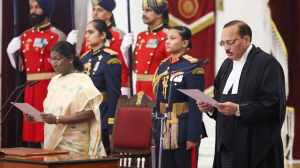Indian PM says no objection to US-Pak N-deal: Pak
In yet another instance that has created widespread confusion,Pakistani authorities are claiming that the Indian Prime Minister Manmohan Singh has said that he has no objections to Pakistan scripting a nuclear deal with the US.
In yet another instance that has created widespread confusion,Pakistani authorities are claiming that the Indian Prime Minister Manmohan Singh has said that he has no objections to Pakistan scripting a nuclear deal with the US. This came in as a sideline to a conference where it was being declared that there will be no meeting of the Pak and Indian prime minsiters at SAARC summit.
Pakistan on Thursday said no meeting has been scheduled so far between Prime Ministers Yousuf Raza Gilani and Manmohan Singh on the sidelines of the SAARC summit later this month though it had proposed one and insisted that restarting dialogue was “a necessity”.
Foreign Office spokesman Abdul Basit told a weekly news briefing that no meeting between the two premiers has been scheduled on the sidelines of the regional summit to be held in Thimphu on April 28-29 though a proposal for such a meeting was part of a roadmap provided recently by Islamabad to New Delhi.
“As far as a formal meeting in Bhutan is concerned,it has yet not been pencilled in.
“Nevertheless,given that our roadmap also provided for a summit meeting in Bhutan,we look forward to a meaningful engagement with India,” he said in response to a question.
Singh was on Wednesday evasive when asked whether he would meet Gilani in Bhutan during the SAARC Summit. “I think there is still time to think about the meeting in Bhutan. When we reach there we would cross the bridge.”
The Prime Minister had yesterday said India could resume dialogue with Pakistan on all issues if “concrete” and “effective” action is taken against those behind the Mumbai terror strikes.
Basit said neither country would be doing the other a “favour” by resuming the peace process that was stalled in the wake of the 2008 Mumbai terror attacks.
“Let me also underline here that engaging in meaningful and result-oriented talks is in our mutual interest and in the interest of this region. It is not a favour by Pakistan to India or vice versa,” he said.
Asked about Singh’s remarks,Basit said the legal procedure for the of Pakistani suspects linked to the Mumbai attacks was underway.
However,he made it clear that talks are “a necessity between the two countries and for peace in the region”.
Referring to the two brief meetings between Gilani and Singh on the sidelines of the Nuclear Security Summit hosted by the US in Washington,Basit said the “two Prime Minister shook hands and exchanged pleasantries”.
He also said “there was mutual warmth in the handshakes”.
In response to a question about Singh’s reported comments that India was not averse to a civil nuclear deal between Pakistan and the US,Basit said: “It is good to see India taking a position based on the principle of non-discrimination.
The report had been carried by a Pakistan news website.
“Asked about concerns expressed by Indian leaders that military aid provided by the US to Pakistan could be used against India,he said the relationship between Islamabad and Washington was not directed against any country.
“Prime Minister Singh has reiterated India’s position and Pakistan has its own position.
“We are developing a long-term partnership with the US and this partnership is not against the interest of any third country. This partnership will purely help promote peace,stability and prosperity in this region,” the spokesman said.
Basit also dismissed reports about France being reluctant to provide civil nuclear technology to Pakistan as “speculation”.
The US too is working closely with Pakistan to help it overcome its energy deficit,he said.



- 01
- 02
- 03
- 04
- 05



























